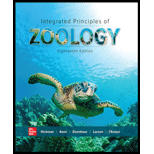
Loose Leaf For Integrated Principles Of Zoology
18th Edition
ISBN: 9781260411140
Author: Cleveland P Hickman Jr. Emeritus, Susan L. Keen, David J Eisenhour Professor PhD, Allan Larson, Helen I'Anson Associate Professor of Biology
Publisher: McGraw-Hill Education
expand_more
expand_more
format_list_bulleted
Concept explainers
Question
Chapter 13, Problem 4RQ
Summary Introduction
To distinguis: The polyp and medusa forms.
Introduction: The Cnidarians are a phylum of simple animals. It includes jellyfish, hydras, corals, and sea anemones. The Cnidarians are divided into major classes, namely the Scyphozoa, Anthozoa, Staurozoa, and Hydrozoa.
Expert Solution & Answer
Want to see the full answer?
Check out a sample textbook solution
Students have asked these similar questions
The Sentinel Cell: Nature’s Answer to Cancer?
Molecular Biology Question
You are working to characterize a novel protein in mice. Analysis shows that high levels of the primary transcript that codes for this protein are found in tissue from the brain, muscle, liver, and pancreas. However, an antibody that recognizes the C-terminal portion of the protein indicates that the protein is present in brain, muscle, and liver, but not in the pancreas. What is the most likely explanation for this result?
Molecular Biology
Explain/discuss how “slow stop” and “quick/fast stop” mutants wereused to identify different protein involved in DNA replication in E. coli.
Chapter 13 Solutions
Loose Leaf For Integrated Principles Of Zoology
Ch. 13 - Prob. 1RQCh. 13 - What characteristics of phylum Cnidaria are most...Ch. 13 - Name and distinguish the taxonomic classes in...Ch. 13 - Prob. 4RQCh. 13 - Explain the mechanism of nematocyst discharge. How...Ch. 13 - Prob. 6RQCh. 13 - Prob. 7RQCh. 13 - Prob. 8RQCh. 13 - Prob. 9RQCh. 13 - Prob. 10RQ
Ch. 13 - Prob. 11RQCh. 13 - Distinguish the following from each other:...Ch. 13 - Prob. 13RQCh. 13 - Describe three specific interactions of anemones...Ch. 13 - Contrast the skeletons of hexacorallian and...Ch. 13 - Coral reefs generally are limited in geographic...Ch. 13 - Prob. 17RQCh. 13 - How do zooxanthellae contribute to the welfare of...Ch. 13 - Prob. 19RQCh. 13 - What characteristics of Ctenophora are most...Ch. 13 - How do ctenophores swim, and how do they obtain...Ch. 13 - Compare cnidarians and ctenophores, giving five...Ch. 13 - Prob. 23RQ
Knowledge Booster
Learn more about
Need a deep-dive on the concept behind this application? Look no further. Learn more about this topic, biology and related others by exploring similar questions and additional content below.Similar questions
- Molecular Biology Question A gene that codes for a protein was removed from a eukaryotic cell and inserted into a prokaryotic cell. Although the gene was successfully transcribed and translated, it produced a different protein than it produced in the eukaryotic cell. What is the most likely explanation?arrow_forwardMolecular Biology LIST three characteristics of origins of replicationarrow_forwardMolecular Biology Question Please help. Thank you For E coli DNA polymerase III, give the structure and function of the b-clamp sub-complex. Describe how the structure of this sub-complex is important for it’s function.arrow_forward
- Molecular Biology LIST three characteristics of DNA Polymerasesarrow_forwardMolecular Biology RNA polymerase core enzyme structure contains what subunits? To form holo enzyme, sigma factor is added to core. What is the name of the structure formed? Give the detailed structure of sigma factor and the function of eachdomain. Please help. Thank youarrow_forwardMolecular Biology You have a single bacterial cell whose DNA is labelled with radioactiveC14. After 5 rounds of cell division, how may cells will contain radioactive DNA? Please help. Thank youarrow_forward
- 1. Explain the structure and properties of atoms and chemical bonds (especially how they relate to DNA and proteins). Also add some pictures.arrow_forward1. In the Sentinel Cell DNA integrity is preserved through nanoscopic helicase-coordinated repair, while lipids in the membrane are fortified to resist environmental mutagens. also provide pictures for this question.arrow_forwardExplain the structure and properties of atoms and chemical bonds (especially how they relate to DNA and proteins). Also add some pictures.arrow_forward
- In the Sentinel Cell DNA integrity is preserved through nanoscopic helicase-coordinated repair, while lipids in the membrane are fortified to resist environmental mutagens. also provide pictures for this question.arrow_forward1. Explain how genetic information is stored, copied, transferred, and expressed. Also add some pictures for this question.arrow_forward!. Describe biological macromolecules (DNA, RNA, proteins, lipids, etc.) and how they function in the cell. also provide some images for this question.arrow_forward
arrow_back_ios
SEE MORE QUESTIONS
arrow_forward_ios
Recommended textbooks for you
 Biology 2eBiologyISBN:9781947172517Author:Matthew Douglas, Jung Choi, Mary Ann ClarkPublisher:OpenStax
Biology 2eBiologyISBN:9781947172517Author:Matthew Douglas, Jung Choi, Mary Ann ClarkPublisher:OpenStax Biology (MindTap Course List)BiologyISBN:9781337392938Author:Eldra Solomon, Charles Martin, Diana W. Martin, Linda R. BergPublisher:Cengage Learning
Biology (MindTap Course List)BiologyISBN:9781337392938Author:Eldra Solomon, Charles Martin, Diana W. Martin, Linda R. BergPublisher:Cengage Learning Concepts of BiologyBiologyISBN:9781938168116Author:Samantha Fowler, Rebecca Roush, James WisePublisher:OpenStax College
Concepts of BiologyBiologyISBN:9781938168116Author:Samantha Fowler, Rebecca Roush, James WisePublisher:OpenStax College Human Physiology: From Cells to Systems (MindTap ...BiologyISBN:9781285866932Author:Lauralee SherwoodPublisher:Cengage Learning
Human Physiology: From Cells to Systems (MindTap ...BiologyISBN:9781285866932Author:Lauralee SherwoodPublisher:Cengage Learning


Biology 2e
Biology
ISBN:9781947172517
Author:Matthew Douglas, Jung Choi, Mary Ann Clark
Publisher:OpenStax


Biology (MindTap Course List)
Biology
ISBN:9781337392938
Author:Eldra Solomon, Charles Martin, Diana W. Martin, Linda R. Berg
Publisher:Cengage Learning

Concepts of Biology
Biology
ISBN:9781938168116
Author:Samantha Fowler, Rebecca Roush, James Wise
Publisher:OpenStax College

Human Physiology: From Cells to Systems (MindTap ...
Biology
ISBN:9781285866932
Author:Lauralee Sherwood
Publisher:Cengage Learning